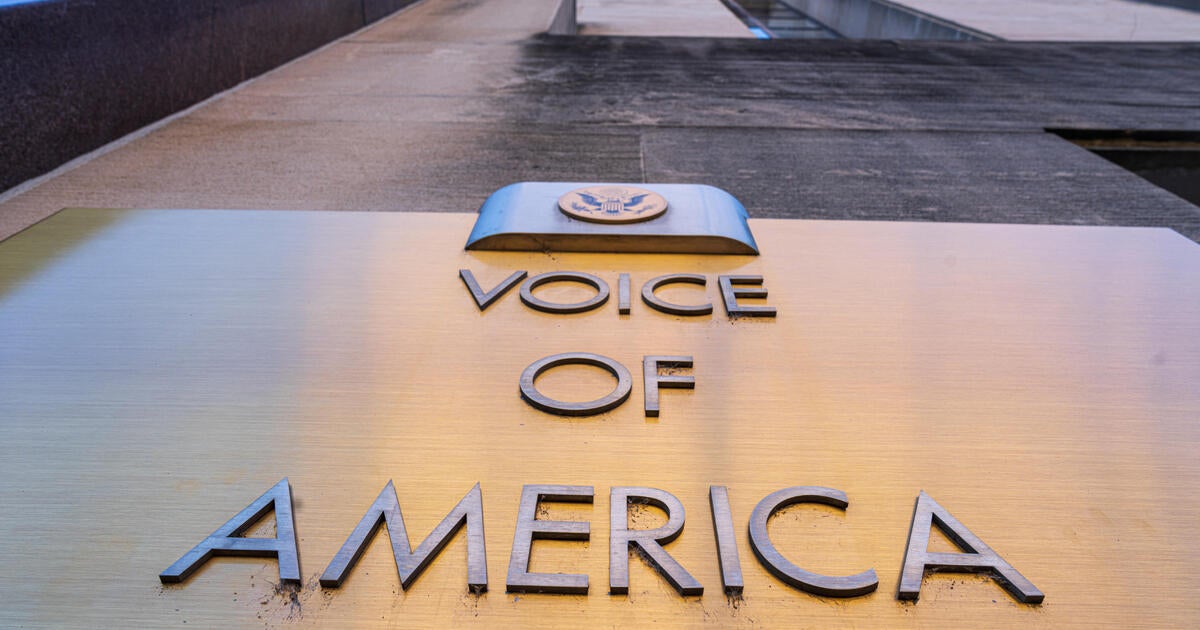In a recent move by the Trump administration, there has been a significant reduction in funding for Voice of America (VOA) and other government-run pro-democracy programs. This latest action continues President Trump’s systematic restructuring of the government without the approval of Congress. Reliable sources have confirmed to CBS News that all full-time employees of Voice of America were notified on Saturday that they have been placed on administrative leave.
The sweeping cuts were initiated on Friday night, immediately after Congress had passed its latest funding bill. President Trump directed his administration to minimize the functions of numerous agencies to the bare minimum required by law. This directive was inclusive of the U.S. Agency for Global Media, a key department which houses several media organizations including Voice of America, Radio Free Europe and Asia, and Radio Marti, a Spanish-language news outlet broadcasting into Cuba.
The following morning, Kari Lake, a former Arizona gubernatorial and U.S. Senate candidate, and now a senior advisor to the agency, posted on social media platform X, instructing employees to check their emails. This post coincided with the notifications being sent out to staff members of Voice of America, informing them of their placement on paid administrative leave.
Notices were also dispatched regarding the termination of grants to Radio Free Asia and other programs run by the agency. Voice of America is a significant channel for transmitting United States domestic news to other countries, often translated into local languages for better comprehension. Similarly, Radio Free Asia, Europe, and Marti broadcast news into countries with authoritarian regimes such as China, North Korea, and Russia.
These networks collectively reach an estimated audience of 427 million people. Their existence can be traced back to the Cold War era, and they form part of a network of government-funded organizations tasked with extending U.S. power and combating authoritarian regimes. This network includes the United States Agency for International Development (USAID), another agency targeted by President Trump’s budget cuts.
These latest reductions are particularly controversial as the Agency for Global Media is an independent agency, chartered by Congress. In 2020, Congress passed a law to limit the power of the agency’s presidentially appointed executives. However, President Trump has already made several moves to gut congressionally-mandated programs, setting up a potential showdown in the Supreme Court over the limits of presidential power.
President Trump’s order for reductions is not exclusive to media agencies. It also includes several other lesser-known government agencies such as the Woodrow Wilson International Center for Scholars, a nonpartisan think tank, the United States Interagency Council on Homelessness, and the Community Development Financial Institutions Fund.
The Trump administration’s actions concerning Voice of America have already caused significant controversy. Previously, the administration suspended a respected journalist who had noted criticism of Trump and cancelled contracts with external news organizations, including the Associated Press.
These recent moves reflect President Trump’s continued campaign to restructure the government, often bypassing Congressional approval. While these actions have been met with criticism, they also raise questions about the limits of presidential power and the potential consequences for government-funded agencies and their employees. As these changes continue to unfold, the future of these agencies and their role in promoting democracy and combating authoritarianism remains uncertain.
This is yet another instance of the Trump administration’s assertive stance towards restructuring government agencies. It again highlights the ongoing power struggle between the executive branch and Congress, and underscores the complex dynamics of the U.S. political system. As we continue to monitor these developments, it is essential to understand the broader implications of these decisions and their potential impact on U.S. democracy promotion efforts worldwide. The future of these agencies, their employees, and the millions of people they reach is now more uncertain than ever.









